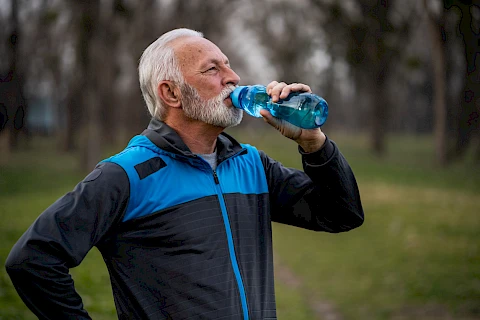
Aging bodies naturally change and this includes the bladder. These changes can mean dealing with incontinence or more frequent trips to the restroom for many seniors. It is important to maintain good bladder health for overall quality of life. Senior Helpers shares simple lifestyle changes and a few tweaks in daily habits that can make a significant difference in supporting better bladder health in seniors.
What is Bladder Aging?
Bladder muscles may become weaker and the capacity of the bladder to hold urine might decrease as we grow older. This process can lead to common issues such as incontinence or needing to urinate more frequently. Seniors may experience slower urine flow and the inability to empty the bladder. It is wise to be aware of these normal changes and manage them proactively to maintain comfort and health. Here are a few things you can do:
1. Stay Hydrated
Adequate hydration and drinking enough water help flush out toxins and reduce the risk of urinary tract infections. Seniors should aim for 6 to 8 cups of water daily unless advised otherwise by a healthcare provider. Sip throughout the day rather than drinking large amounts at once to avoid overwhelming the bladder. Beverages like tea and coffee can contribute to fluid intake but can also act as a diuretic.
2. Mind Your Diet
What we eat and drink significantly affects bladder health. Being mindful of your diet can help in managing bladder concerns. Avoid foods and drinks like spicy dishes, citrus fruits, and carbonated beverages that may irritate the bladder. A balanced diet rich in fiber can prevent constipation, which indirectly benefits the bladder. Bladder-friendly options include whole grains, fruits, and vegetables. These healthy options also contribute to overall well-being.
3. Limit Alcohol and Caffeine
Alcohol and caffeine can have a direct impact on bladder function. Both can increase urine production and potentially irritate the bladder. Consider reducing or eliminating these substances to see if symptoms improve. Try herbal teas or caffeine-free alternatives as substitutes. Of course, moderation is key. If completely quitting isn't feasible, strive to limit intake.
4. Exercise Regularly
Engaging in regular exercise strengthens the pelvic floor muscles and supports urinary function. Always consult with healthcare providers before starting any new exercise regimen. Include activities like walking, swimming, or yoga in your daily routine. Pelvic floor exercises, like Kegels, specifically target muscles that control urination. Find activities you enjoy to make them more likely to become a regular part of your day.
5. Communicate with Caregivers and Professionals
It is important to discuss bladder health concerns with your doctor. Your caregivers and medical professionals can provide the necessary guidance and support. Don't hesitate to talk about any changes or challenges you are experiencing. They can help tailor a plan that includes lifestyle adjustments and other interventions. Open communication can lead to better management and improved comfort.
6. Practice Bladder Training
Bladder training is a technique that involves establishing a bathroom schedule to improve bladder control. Start by keeping a diary of bathroom visits to identify patterns. Gradually increase the time between trips to the restroom to build bladder endurance. This practice can help reduce urgency and improve overall control.
Senior Helpers Supports Bladder Health
Senior Helpers offers compassionate, in-home senior care services customized to meet the specific needs of our community's seniors. If you live in the Hollywood, Fort Lauderdale, or Miramar areas, don't hesitate to contact us anytime at Senior Helpers of Broward County. We are happy to help ensure seniors are living the healthy, satisfying lives they deserve.